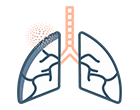Idiopathic Pulmonary Fibrosis
Idiopathic Pulmonary Fibrosis (IPF) is a specific form of chronic, progressive lung disease defined as the presence of progressive lung scarring in the form of fibrosing interstitial pneumonia of unknown cause with the histopathological finding of usual interstitial pneumonia (UIP).





